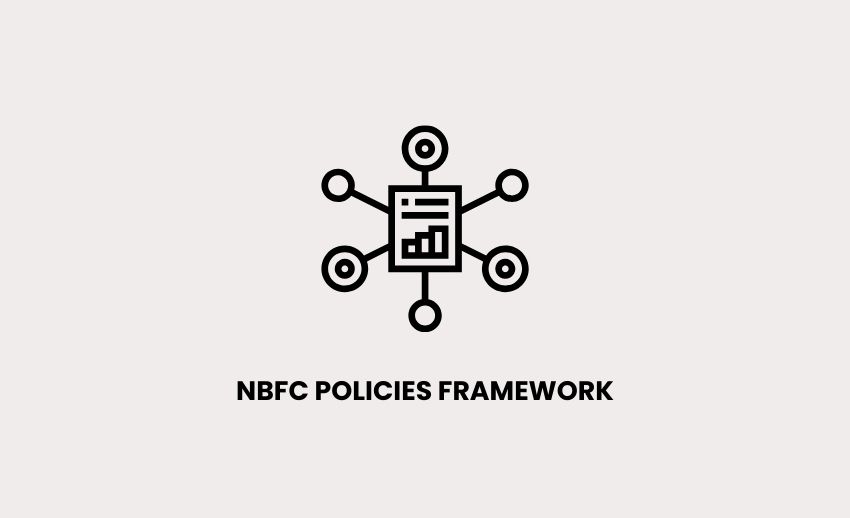
In the ever-evolving landscape of financial services, Non-Banking Financial Companies (NBFCs) have emerged as significant players, complementing traditional banking institutions and providing a diverse array of financial products and services. The policy framework governing these NBFCs is a crucial aspect of financial regulation that profoundly impacts the stability and vibrancy of a nation’s financial ecosystem. NBFCs have been instrumental in extending credit to underserved sectors, fostering entrepreneurship, and spurring economic growth. However, their dynamic nature necessitates a nuanced regulatory approach, one that balances risk mitigation with the promotion of financial inclusion and innovation. In this blog, we’ll navigate the intricate web of regulations, compliance requirements, and evolving best practices that shape the NBFC sector.
The regulatory framework governing Non-Banking Financial Companies (NBFCs) in India is a vital aspect of the country’s financial sector, designed to ensure stability, transparency, and investor protection. The framework comprises several key components, functions, and plays a critical role in the Indian financial ecosystem.
Firstly, the Reserve Bank of India (RBI) is the apex regulatory authority overseeing NBFCs. It classifies them into various categories, such as Asset Finance Companies, Loan Companies, and Investment Companies, each subject to specific regulations based on their activities and size. NBFCs are required to register with the RBI and adhere to minimum capital adequacy norms, which help safeguard their financial health.
One of the primary functions of the regulatory framework is to monitor the financial health of NBFCs and mitigate systemic risks. RBI sets prudential norms, including capital adequacy ratios and provisioning requirements, to ensure financial stability. Additionally, regulatory reporting and disclosure requirements enhance transparency and allow stakeholders to assess the risk profile of these companies.
The framework also aims to protect the interests of investors and depositors. Regulatory measures, such as stringent Know Your Customer (KYC) and anti-money laundering (AML) guidelines, are enforced to prevent money laundering and fraudulent activities. In case of distress, RBI can issue directions to ensure depositors’ funds are safeguarded.
The importance of this regulatory framework cannot be overstated. It promotes healthy competition, encourages innovation, and ensures that NBFCs operate in a manner that does not jeopardize the broader financial system. By maintaining a balance between fostering growth and mitigating risk, the regulatory framework for NBFCs in India contributes to the overall stability and integrity of the financial sector.
Policies play a crucial role in ensuring the compliance of Non-Banking Financial Companies (NBFCs) in India, as they help establish a structured framework for their operations and contribute to financial stability and consumer protection. Here are five detailed points explaining the importance of policies in NBFC compliance:
Policies act as a set of guidelines and rules that NBFCs must adhere to in accordance with the regulations set forth by the Reserve Bank of India (RBI). These policies provide a clear roadmap for NBFCs to follow, ensuring they operate within the legal framework. Compliance with regulatory policies is vital for maintaining the financial system’s integrity and preventing financial instability.
Policies help NBFCs identify, assess, and mitigate risks effectively. By formulating and implementing risk management policies, NBFCs can minimize exposure to various financial and operational risks. This, in turn, ensures the stability of the sector and protects the interests of investors and consumers.
Policies often include provisions related to fair lending, disclosure of terms and conditions, and handling of customer complaints. These consumer-centric policies are essential in safeguarding the rights and interests of borrowers and investors. Compliance with these policies ensures that NBFCs treat their customers fairly and transparently.
Prudential norms set by regulatory authorities guide NBFCs in managing their capital adequacy, asset quality, liquidity, and leverage. These norms are vital in maintaining the financial health and stability of NBFCs, ensuring they can meet their obligations to investors and depositors. By adhering to these policies, NBFCs contribute to the overall financial stability of the country.
Policies define the corporate governance structure for NBFCs, ensuring that there is transparency, accountability, and an appropriate system of checks and balances in place. These governance policies are crucial in preventing fraud and misconduct and in building trust among stakeholders, including investors and regulators.
Policies are the backbone of NBFC compliance in India, providing a structured framework for operations, risk management, and governance. Their importance lies in their role in maintaining financial stability, safeguarding consumer interests, and ensuring that NBFCs operate within the boundaries of the law. Compliance with these policies is essential for the sustainability and credibility of NBFCs in the Indian financial sector.
Non-Banking Financial Companies (NBFCs) play a pivotal role in the financial ecosystem by providing a wide range of financial services. To ensure their effective functioning and maintain public trust, NBFCs typically establish and adhere to various types of policies. Three fundamental categories of policies that are crucial in the operation of NBFCs are Corporate Governance Policies, Risk Management Policies, and Customer Relations and Ethics Policies.
Corporate Governance Policies serve as the backbone of NBFC operations, ensuring transparency, accountability, and responsible management. These policies encompass the structure of the company’s board of directors, their roles and responsibilities, and mechanisms for checks and balances. They aim to prevent conflicts of interest, promote fair decision-making, and protect the interests of various stakeholders, including investors and customers.
Risk Management Policies are essential for NBFCs due to the inherent financial risks they face. These policies define the strategies for identifying, assessing, and mitigating risks associated with lending, investment, and market fluctuations. By maintaining a well-defined risk management framework, NBFCs can safeguard their financial stability and uphold their commitments to customers and investors.
Customer Relations and Ethics Policies highlight the commitment of NBFCs to maintaining a high standard of customer service and ethical conduct. These policies guide interactions with clients, emphasizing transparency, fair treatment, and protection of customer data. Moreover, they underscore the ethical values that NBFCs must uphold, such as honesty, integrity, and compliance with regulatory standards. Strong customer relations and ethical practices not only foster trust but also contribute to long-term business success.
In summary, Corporate Governance Policies, Risk Management Policies, and Customer Relations and Ethics Policies are integral components of NBFCs’ operational framework. These policies collectively ensure responsible and ethical conduct, maintain financial stability, and build and maintain the trust of customers and investors. By adhering to these policies, NBFCs can navigate the dynamic financial landscape, meet their financial objectives, and contribute to the stability of the broader financial ecosystem.
The development and implementation of policies for Non-Banking Financial Companies (NBFCs) in India is a critical process aimed at maintaining the integrity and stability of the financial sector. NBFCs play a significant role in providing financial services and credit across various sectors of the economy. This regulatory framework is overseen by the Reserve Bank of India (RBI), and it undergoes continuous development and refinement.
Policy development for NBFCs involves several key steps. The RBI, as the primary regulatory authority, gathers data, conducts research, and assesses economic and financial conditions to identify areas requiring policy attention. Consultation with industry associations, experts, and stakeholders occurs to better understand industry concerns. Policymakers also evaluate the risks associated with NBFC operations, including liquidity, credit, and systemic risks, and formulate policies that mitigate these challenges.
Once policies are developed, they are communicated through notifications and circulars issued by the RBI. These notifications detail changes in rules and regulations that NBFCs must adhere to. Compliance and reporting requirements are established, and NBFCs are expected to align their operations, governance, and risk management processes with the new policies. Regular supervision and inspection by the RBI help ensure compliance, identify violations, assess financial health, and address issues promptly. Non-compliance can result in penalties, warnings, or corrective actions.
A vital aspect of this process is stakeholder engagement. Policymakers maintain an ongoing dialogue with NBFCs, industry associations, and other stakeholders to remain informed about the evolving challenges and opportunities in the sector. Feedback mechanisms, such as consultations and surveys, are used to improve policies and address concerns. The ultimate goal of developing and implementing policies for NBFCs in India is to balance supporting sector growth and innovation while ensuring financial stability and consumer protection. Regular monitoring and policy adaptation are vital to respond to changing economic conditions and the financial landscape effectively.
Certainly, here are detailed explanations for each of the compliance and reporting obligations for Non-Banking Financial Companies (NBFCs) in India:
Registration and Licensing-: NBFCs in India are required to obtain a Certificate of Registration from the Reserve Bank of India (RBI) to legally engage in non-banking financial activities. The registration process involves the submission of various documents and the fulfillment of specific criteria, which may vary based on the type of NBFC, such as Asset Finance Companies, Loan Companies, or Infrastructure Finance Companies. The RBI uses this registration process to screen and assess the financial soundness and integrity of the entity seeking to operate as an NBFC. This regulatory step ensures that only legitimate and financially stable entities enter the financial market, thereby protecting investors and depositors.
Prudential Norms-: Prudential norms are critical regulations for NBFCs set by the RBI. These norms govern various aspects of financial operations to ensure the stability of the NBFC and safeguard the interests of investors and depositors. For instance, capital adequacy norms determine the minimum amount of capital an NBFC must maintain to cover potential losses. Asset classification and provisioning norms mandate how NBFCs should categorize loans and assets, as well as how much provision should be set aside for expected credit losses. These norms aim to maintain financial stability, reduce risk, and enhance transparency in NBFC operations.
Risk Management-: Risk management is an integral part of NBFC operations. NBFCs must establish comprehensive risk management policies that cover various types of risks, including credit risk, market risk, liquidity risk, and operational risk. Credit risk management, for example, involves assessing the creditworthiness of borrowers and establishing credit policies to mitigate potential loan defaults. Effective risk management helps NBFCs identify and mitigate risks, thereby ensuring the stability and sustainability of their operations. This is crucial for maintaining the trust of investors and depositors.
Corporate Governance-: The RBI mandates strong corporate governance practices for NBFCs. This includes having a board of directors with a majority of independent directors who can provide unbiased oversight. Regular board meetings are required to facilitate decision-making, strategic planning, and transparency in governance. These measures ensure accountability and ethical conduct within the NBFC, safeguarding the interests of investors and depositors by preventing mismanagement and misconduct.
Asset Liability Management-: Asset Liability Management is a systematic approach to managing the risks associated with mismatches between the maturity profiles of assets and liabilities. By effectively aligning the maturity of assets and liabilities, NBFCs reduce the risk of liquidity problems and interest rate fluctuations. ALM practices help NBFCs maintain financial stability, as they ensure that the company can meet its financial obligations even under adverse circumstances.
Disclosure and Reporting-: NBFCs are required to provide periodic reports and disclosures to the RBI. These reports include financial statements, annual reports, and other financial data as required by the RBI. These reports serve to keep the RBI informed about the financial health and operations of the NBFC. Regulatory authorities rely on these disclosures to monitor compliance, assess financial stability, and make informed decisions regarding the NBFC’s regulatory status. It also facilitates transparency and accountability in the financial sector.
Capital Adequacy-: Capital adequacy is a measure of an NBFC’s financial strength. NBFCs are required to maintain a minimum level of capital to cover potential losses and risks. The RBI has established specific minimum capital adequacy ratios that NBFCs must adhere to. Adequate capital provides a cushion against unexpected financial shocks and helps ensure the NBFC’s ability to absorb losses without affecting depositors and investors. Compliance with capital adequacy requirements is essential for the overall financial stability and solvency of the NBFC.
A strong policy framework for Non-Banking Financial Companies (NBFCs) is essential for ensuring their stability, integrity, and efficiency in the financial system. Here are some key benefits of having a robust policy framework for NBFCs:
Financial Stability-: A strong policy framework promotes financial stability by imposing prudent regulations and risk management practices on NBFCs. These policies help prevent excessive risk-taking and ensure that NBFCs maintain adequate capital reserves. In times of economic turmoil or crises, this stability is crucial to prevent systemic risks and protect the interests of depositors and investors. Financial stability also enhances the confidence of the public and investors in the NBFC sector, contributing to the overall stability of the financial system.
Consumer Protection-: Robust policies for NBFCs often include guidelines for fair lending practices, disclosure requirements, and the handling of customer complaints. This ensures that consumers are treated fairly and transparently. Consumer protection is essential for maintaining trust in the financial system, as it prevents predatory lending, fraud, and other unethical practices that can harm borrowers. Strong policies in this regard safeguard the interests of customers and contribute to a more inclusive and responsible financial sector.
Market Integrity and Confidence-: A well-regulated NBFC sector fosters market integrity and investor confidence. Investors, both individual and institutional, are more likely to participate in the NBFC market when they have trust in the regulatory framework and believe that the industry operates on a level playing field. This confidence can stimulate investments and the flow of capital, which is essential for the growth and development of the NBFC sector.
Risk Mitigation-: Effective policies in risk management and governance are paramount for NBFCs. These policies require them to conduct risk assessments, set up appropriate risk management systems, and maintain adequate capital reserves. By mandating these risk mitigation measures, a policy framework helps NBFCs identify and address potential risks proactively. This not only protects the stability of individual NBFCs but also minimizes the spillover effects on the broader financial system, reducing the likelihood of financial crises.
Financial Inclusion and Economic Growth-: Strong policies for NBFCs often encourage financial inclusion, particularly in emerging economies. By setting targets for lending to underserved and marginalized segments of the population, these policies help drive economic growth and reduce income inequality. NBFCs play a vital role in reaching borrowers who may not have access to traditional banking services, and a well-defined policy framework ensures that they fulfill this role effectively. Consequently, this promotes economic development and improves the overall quality of life for a broader segment of society.
In conclusion, the policy framework governing Non-Banking Financial Companies (NBFCs) in India is the linchpin of financial stability, integrity, and progress. These policies serve as the guiding principles that not only regulate the operations of NBFCs but also underpin their crucial role in fostering economic growth, financial inclusion, and innovation. By setting stringent standards for registration, prudential norms, risk management, corporate governance, and consumer protection, the Reserve Bank of India (RBI) ensures that NBFCs operate within a structured and ethical framework.
The strength of this framework lies in its ability to strike a balance between risk mitigation and the promotion of financial accessibility. It safeguards the interests of investors, depositors, and consumers while facilitating the flow of capital into diverse sectors of the economy, benefiting individuals and businesses alike. Moreover, these policies adapt to changing economic conditions and technological advancements, ensuring that the NBFC sector remains dynamic and resilient.
In the ever-evolving landscape of financial services, the robust policies underpinning NBFCs provide a steady anchor in turbulent waters, guiding these financial entities towards their mission of empowering entrepreneurs, extending credit to underserved sectors, and contributing to the broader economic prosperity of the nation. With effective policy development, implementation, and compliance, the NBFC sector in India continues to play a vital role in shaping the nation’s financial ecosystem and facilitating progress for all.








